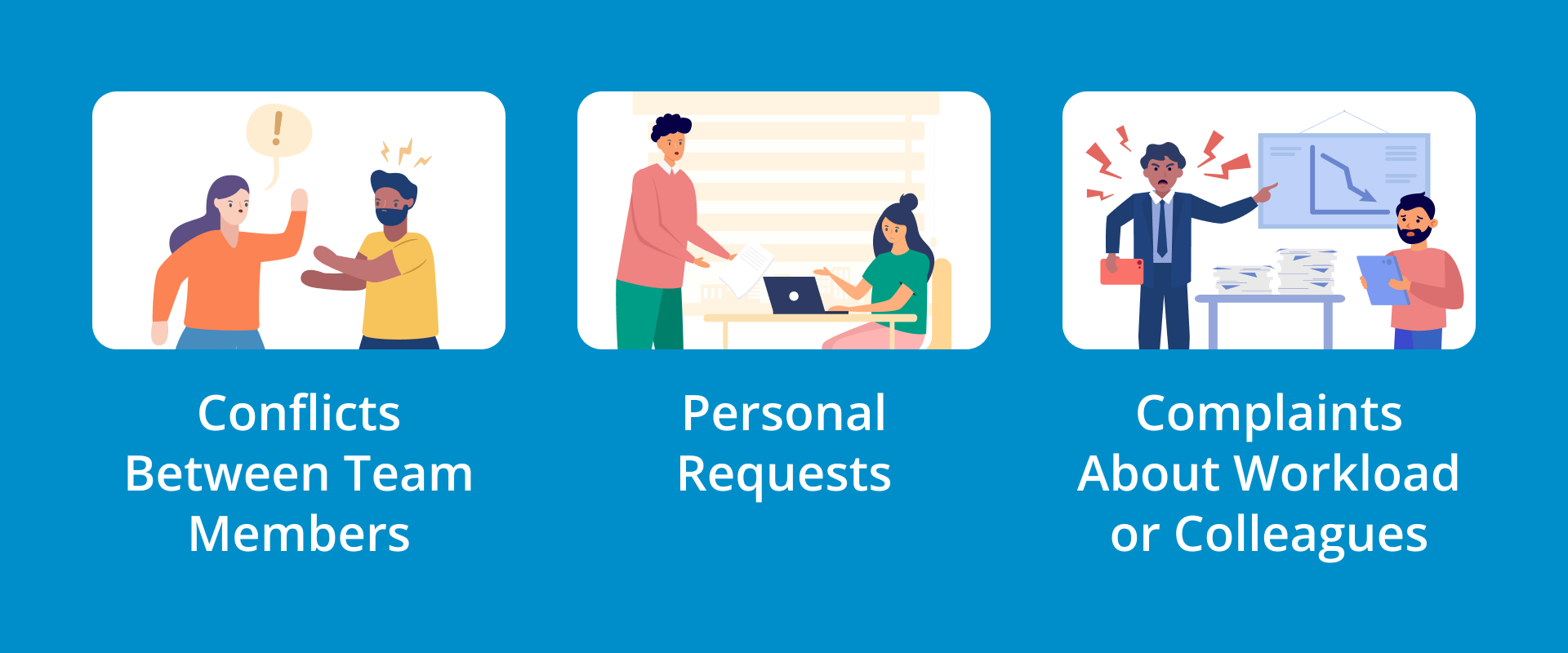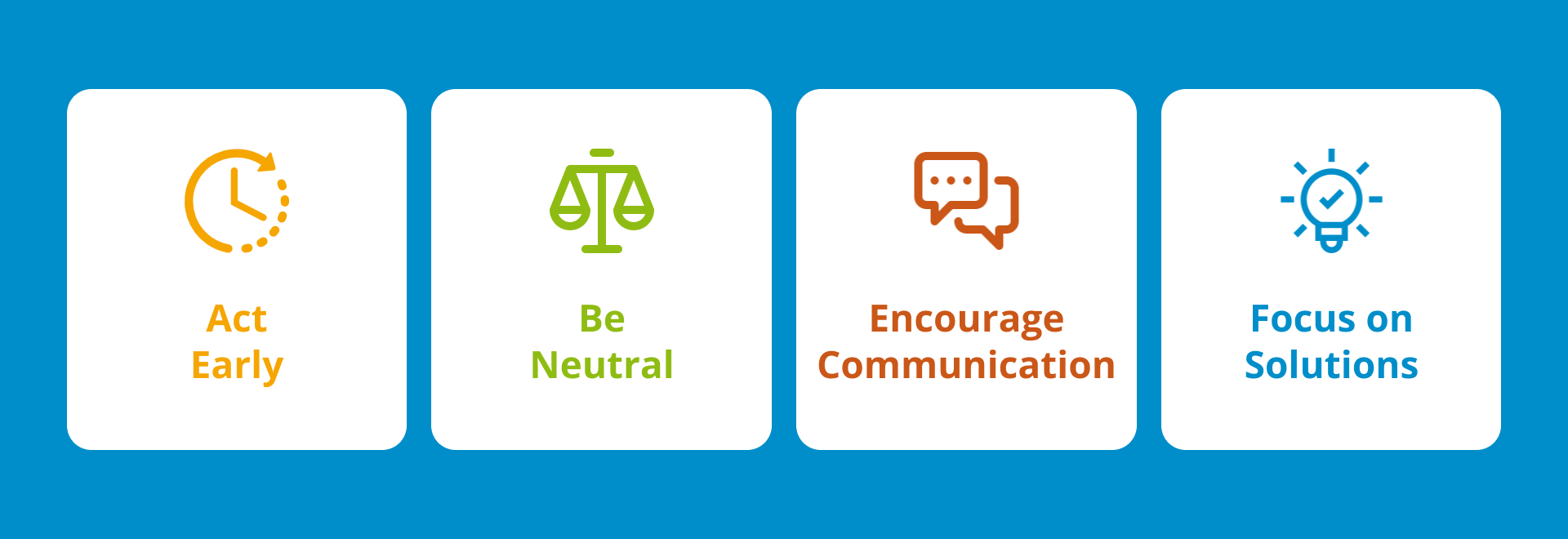
Handling Workplace Challenges: A Guide for New Managers
By Gerry Murray
Being a new manager comes with its fair share of challenges. From managing conflicts between team members to addressing sensitive issues like personal requests or complaints, it can sometimes feel like you’re walking a tightrope. So, how do you navigate these tricky situations while maintaining trust and authority?
In this article, we’ll explore:
- Common workplace challenges that new managers face.
- How to approach conflicts and difficult situations constructively.
- Practical strategies for resolving challenges while maintaining team morale.
What Are Some Common Workplace Challenges?
No matter how well you manage, challenges will arise. The key is learning how to handle them effectively.

Here are some of the most common issues new managers face:
- Conflicts Between Team Members: Disagreements or personality clashes between employees can disrupt team dynamics. It’s essential to address conflicts early before they escalate.
- Personal Requests: Employees might come to you with personal requests, such as time off for personal reasons, schedule adjustments, or flexible work arrangements. Balancing fairness with compassion can be tricky.
- Complaints About Workload or Colleagues: Team members may raise complaints about their workload, other colleagues, or even how you manage the team. Navigating these complaints requires a careful balance of listening, addressing the issues, and maintaining professionalism.
These challenges are part of the job, but how you respond to them will define your leadership.
How Can You Approach Conflicts Constructively?
Conflict is inevitable in any workplace, but how you manage it can make all the difference. Here are some strategies for handling conflicts with confidence and fairness:
- Act Early: When a conflict arises, address it as soon as possible. Allowing issues to fester can damage team morale and make the problem harder to resolve later. Try to have a conversation with the individuals involved before the situation escalates.
- Be Neutral and Objective: When mediating a conflict between team members, remain impartial. Avoid taking sides or jumping to conclusions. Your role is to facilitate a resolution, not to assign blame.
- Encourage Open Communication: Create a safe space for employees to express their concerns and perspectives. Ask open-ended questions, such as, “Can you help me understand the issue from your point of view?” This encourages dialogue rather than defensiveness.
- Focus on Solutions, Not Problems: When conflicts arise, guide the conversation toward finding a resolution. Focus on what can be done to resolve the issue rather than dwelling on the problem itself. For example, if two team members are struggling to collaborate, work with them to develop a plan for clearer communication and cooperation moving forward.

By approaching conflicts calmly and constructively, you set the tone for your team and demonstrate that challenges can be resolved without damaging relationships.
Check out our Collaboration programs to learn more about how to deal with workplace conflicts.
How Should You Handle Sensitive Situations?
As a manager, you will also need to deal with sensitive issues, such as personal requests, complaints, or difficult conversations. Here’s how to navigate these situations:
- Handle Personal Requests with Empathy: When employees come to you with personal requests, such as needing time off or adjustments to their schedule, it’s important to show empathy while also maintaining fairness. Listen to their request carefully and consider the impact on the team before making a decision. Whenever possible, offer a solution that balances their needs with the needs of the team.
- Address Complaints Professionally: When employees bring up complaints, whether about workload or a colleague, approach the situation with an open mind. Avoid being defensive, and instead ask questions to understand the root cause. If the complaint is valid, work with the employee to find a solution. If not, explain your reasoning clearly and respectfully.
- Prepare for Difficult Conversations: Whether you’re delivering feedback about underperformance or addressing behavioral issues, difficult conversations are part of the job. Approach these conversations with respect, be clear and specific, and offer constructive solutions for improvement.
When you handle sensitive situations with care and professionalism, you build trust and respect among your team.
How Can You Maintain Team Morale During Challenging Times?
Even when challenges arise, it’s important to keep team morale high. Here are some ways to maintain a positive atmosphere, even when dealing with difficult issues:
- Keep Communication Open: Regular communication with your team helps to maintain transparency and trust. When challenges arise, be open about what’s happening and how you’re addressing the issue. This reduces uncertainty and keeps morale from dipping.
- Acknowledge Efforts: Even during tough times, recognizing your team’s hard work goes a long way. When employees feel appreciated, they’re more likely to stay motivated, even when the going gets tough.
- Lead by Example: Stay calm, composed, and solution-focused when handling workplace challenges. Your attitude will set the tone for your team and help them remain confident in your leadership.
By keeping the lines of communication open and showing appreciation for your team’s efforts, you help maintain morale and foster a positive working environment, even when things get challenging.
Master the Essentials
- Common workplace challenges include conflicts between team members, personal requests, and complaints about workload or colleagues.
- Approach conflicts with a neutral, objective mindset and focus on finding solutions rather than assigning blame.
- Handle sensitive situations with empathy and professionalism, ensuring fairness while addressing the needs of the team.
- Maintain team morale during challenging times by keeping communication open, acknowledging efforts, and leading by example.

This article is adapted from our Team Leader Essentials program. To learn more about this program download our brochure or book a short call.
Next Article: Managing Difficult Employees: Clear and Firm Strategies for New Managers
Dealing with difficult employees requires a clear and firm approach. In our next article, we’ll explore strategies for managing challenging behavior and maintaining a productive team dynamic.
About Leading People Insights
Our mission is to empower leaders and HR professionals with insights and tools to help leaders thrive and bring out the best in themselves and their teams.
If you find our content valuable, we encourage you to share it with friends and colleagues who could benefit. Invite them to follow our page and join the conversation!

